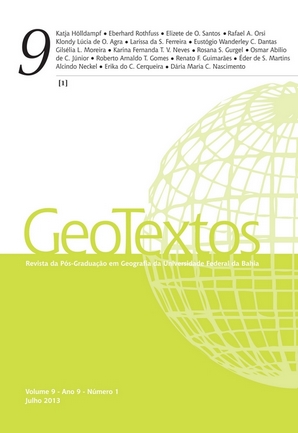URBAN SELF-ORGANISATION IN DEPRIVED NEIGHBORHOODS: POSSIBILITIES AND LIMITS OF AUTONOMOUS COLLECTIVE ARTICULATION IN SALVADOR DA BAHIA
DOI:
https://doi.org/10.9771/1984-5537geo.v9i1.8350Keywords:
Sustainable urban development, Urban self-organization, Community-Building processes, Urban neighbourhoodsAbstract
From a comparative point of view, the given article is concerned with the possibilities and restrictions of urban self-organization within city’s neighbourhoods. Drawing upon a qualitative comparison between the case studies Alto de Ondina and Alto da Sereia – two disadvantaged urban neighbourhoods in the southern city centre of Salvador da Bahia (Brazil) – and considering the conditional framework of daily life there, the idiographic context conditions that foster and alternatively impede self-organization are to be developed on data drawn from empirical surveys. Here, the data-led interpretations reach beyond the local and regional context and offer fundamental insights into auto-centered and autonomous acts of articulation. In Brazil, participative planning processes have been the common sense for urban governance. However, participative strategies tend to stand under the sign of codetermination, whereas the principles of self-determination and auto-centered articulation of collective interests are immantently present during processes of civic self-organization. Due to the fact that self-organized communities do not fall within a defined institutional framework or existing system, they are capable to articulate their needs and interests collectively. The underlying concept of “Agora Governance” in accordance with Korff & Rothfuss (2009) offers the possibility to stimulate urban management processes in a sustainable way, bringing together the civic perspective of the “human city” and the expert perspective of the “infrastructural city” into a consensual but often highly disputed negotiation process.Downloads
Downloads
Published
How to Cite
Issue
Section
License
Autores que publicam nesta revista concordam com os seguintes termos:
Autores mantém os direitos autorais e concedem à revista o direito de primeira publicação, com o artigo simultaneamente licenciado sob a Licença Creative Commons Creative Commons CC BY que permite o compartilhamento do trabalho com reconhecimento da autoria e publicação inicial nesta revista. Esta licença permite que outros distribuam, remixem, adaptem e criem a partir do seu trabalho, mesmo para fins comerciais, desde que lhe atribuam o devido crédito pela criação original. É a licença mais flexível de todas as licenças disponíveis. É recomendada para maximizar a disseminação e uso dos materiais licenciados. Ver o resumo da licença em: https://creativecommons.org/licenses/by/4.0/ Ver o texto legal da licença em: https://creativecommons.org/licenses/by/4.0/ Consulte o site do Creative Commons: https://creativecommons.org/licenses/?lang=pt
Autores têm autorização para assumir contratos adicionais separadamente, para distribuição não-exclusiva da versão do trabalho publicada nesta revista (ex.: publicar em repositório institucional ou como capítulo de livro), com reconhecimento de autoria e publicação inicial nesta revista.
Autores têm permissão e são estimulados a publicar e distribuir seu trabalho online (ex.: em repositórios institucionais ou na sua página pessoal) a qualquer ponto antes ou durante o processo editorial, já que isso pode gerar alterações produtivas, bem como aumentar o impacto e a citação do trabalho publicado (Veja O Efeito do Acesso Livre).






